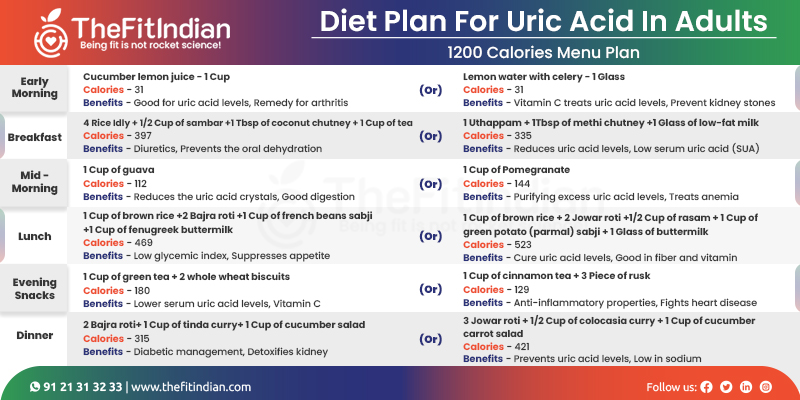Causes and Consequences Of High And Low Levels of Uric Acid In Adult
Reviewed by: Dr. T S Deepthi Sarojini | Author: Manoja Kalakanti
Unusual uric acid levels in the urine are cause for concern. Uric acid in adults is developed when the body breaks down purines and crystalline compounds in certain foods. This naturally occurring waste product dissolves in the blood, travels through the kidneys, and is excreted from the body via urine.
To maintain normal levels, you must limit your intake of certain foods, particularly those high in purines. Excess uric acid is excreted in the intestines or through the urine. Uric acid levels that are too high can be harmful to your health. Therefore, it is critical to maintain or reduce the proper level if necessary. In addition, people with severe affiliated health conditions or long-standing uric acid spikes in the blood may experience high uric acid symptoms.

Symptoms Of Uric Acid Levels
Low uric acid levels are a symptom in and of themselves, accompanying the issues. One of the signs leading to atherosclerosis and strokes is oxidative stress, in which oxidants are converted to peroxides due to low levels. Here are some symptoms of uric acid levels.
• Excruciating joint pain
• Over time, the pain spreads to the joints.
• Joint swollenness
• Tenderness and redness
• Stiffness of the joints
• Formation of uric acid stones in the skin
• Joint misalignment
Causes Of High Uric Acid Levels
The leading causes of high uric acid levels are increased uric acid production and the kidney’s inability to eliminate uric acid from the body. One-third of the uric acid in the human body is derived from purine-rich foods and beverages. The remaining two-thirds are generated by the body naturally. As a result, it’s critical to understand the causes of possessing too much of this acid.
1. Diuretics
To help control high blood pressure, these medications increase urine production. However, it causes the kidneys to excrete water, enhancing the risk of high uric acid due to the kidneys’ inability to process it.
2. Genetics
Gout is frequently associated with genetic diseases, and people with high uric acid experience gout attacks.
3. Hypothyroidism
Thyroid function and purine metabolism are inextricably linked, and increased uric acid concentration results from increased cell metabolism.
4. Renal Deficiency
The kidneys oversee controlling blood pressure and blood composition. Organic waste is filtered by the kidney and excreted from the body. Because of renal artery disease, low blood pressure, hemolytic uremic syndrome, and other factors, the kidneys may not function normally. In addition, renal insufficiency raises blood uric acid levels.
5. Tumor Lysis Syndrome (TLS)
Cancer has become one of the most lethal diseases, slowly affecting the body’s overall effectiveness. This is because cancer-affected cells are released into the circulatory system during chemotherapy due to a higher turnover rate of cell death.
If high uric acid symptoms persist and expand to your joints, you will suffer significantly from gout or uric acid kidney stones.
How to Reduce Uric Acid
You can reduce high uric acid levels, symptoms, and causes naturally by watching your diet and following the guidelines below.
Foods with Low Purine
• Fruits: All fruits are generally safe for people with gout. Cherries may even aid in preventing attacks by lowering uric acid levels and decreasing inflammation.
• Vegetables: All vegetables such as potatoes, peas, mushrooms, and dark green leafy vegetables are acceptable.
• Legumes: Lentils, beans, soybeans, and tofu
• Nuts and seeds: All nuts and seeds
• Whole grains: Oats, brown rice, and barky
• Dairy products: While all dairy products are safe, low-fat dairy appears to be especially beneficial.
• Eggs
• Beverages: Coffee, tea, and green tea
• Herbs and spices: Any herbs and spices will do
• Plant-based oils: Canola, coconut, and olive
Foods You Can Eat in Moderation
• Meat: This includes chicken, beef, pork, and lamb. Other fish: Fresh or canned salmon has lower purine levels than most other fish.
• Whole grains include whole grain bran, oat bran, and whole grain bread
Avoiding High Purine Foods
If you have high blood uric acid levels, here are a few foods to avoid in uric acid.
• All organ meats, including liver, kidney, and brain
• Sugary drinks: Specifically, fruit juices and sugary sodas
• Sugars added: honey, agave nectar, and high fructose corn syrup
• Types of yeast: Nutritional yeast, Brower yeast, other yeast, and supplements
• Seafood
• Cauliflower, spinach, and peas are among the vegetables
Tips For Reduced Uric Acid Levels and Gout
• Maintain a healthy weight
• Consume fresh fruit, vegetables, whole wheat products, and pulses daily
• Consume no more than 100 g of meat, sausages, fish, or poultry per day
• Drinking alcohol only on occasion affects uric acid elimination
• Consume low-fat foods; eating high-fat foods promotes weight gain
• Drink two liters of low-calorie fluids per day
To encourage the removal of uric acid through your urine, increase your liquid intake, particularly your water intake.
Consult a doctor if you have any issues with uric acid levels or if you are experiencing pain or other uric acid-related symptoms. They will be able to diagnose if you have an implicit health issue that needs to be treated, as well as how to handle your diet to reduce uric acid levels.
Diet For High and Low Levels of Uric Acid
Suppose you notice that the uric acid levels in your blood are fluctuating. But do you realize what it is and what difficulties it can cause if you don’t balance it? You should be aware of the chemical your body produces when it processes purines in certain drinks and foods. Here is the uric acid diet to follow.

Summing Up:
It’s critical to be aware of your foods if you have high uric acid levels. Some foods can cause an increase in uric acid levels, which can cause pain and inflammation. To avoid this, eat a diet devoid of purine-rich foods.
FAQ’s
1. How to lower uric acid levels naturally with diet?
Uric acid can be treated by drinking plenty of water and eating uric acid-friendly foods such as berries, celery seeds, nettles, lemon juice, fish oil, black cherry juice, banana, and apple cider vinegar.
2. Does drinking water help to flush out excess uric acid?
Yes. Staying hydrated aids in the removal of uric acid from your kidneys as well as the removal of all toxins from your body
3. How do antioxidant foods help in balancing the acid levels in the body?
Antioxidants benefit your body by protecting it from free radicals. Including antioxidant-rich foods that help you in balancing uric acid levels by removing toxins from the body.
4. What should be normal urine pH?
The pH of urine can range from 4.5 to 9.0, but the ideal range is still.
5. What causes lower uric acid levels?
One of the most common causes of low uric acid is Fanconi syndrome, a hereditary disorder that causes low levels of this substance due to kidney dysfunction.
6. What are the underlying conditions seen in higher uric acid levels?
Kidney disease, diabetes, hypothyroidism, psoriasis, arthritis, gout, and a few cancers are all caused by high uric acid levels in our blood cells.
7. Will Vitamin C foods can help you to reduce uric acid levels?
Yes. Vitamin C-rich foods are another way to keep your uric acid levels in check. These foods dissolve and eliminate uric acid from the body.
8. What are the best foods to cure your uric acid levels?
Berries such as strawberry, raspberry, blueberry, apples, and cherries have anti-inflammatory properties and are extremely effective at neutralizing uric acid.
9. By eating non-veg uric acid, levels increase in the body.
Yes. Eating non-vegetarian foods is prone to high uric acid levels in the body.
10. Which foods to include in the uric acid diet?
To reduce uric acid levels, eat oats, whole grains, and vegetables like broccoli, pumpkin, and celery.




Manoja Kalakanti